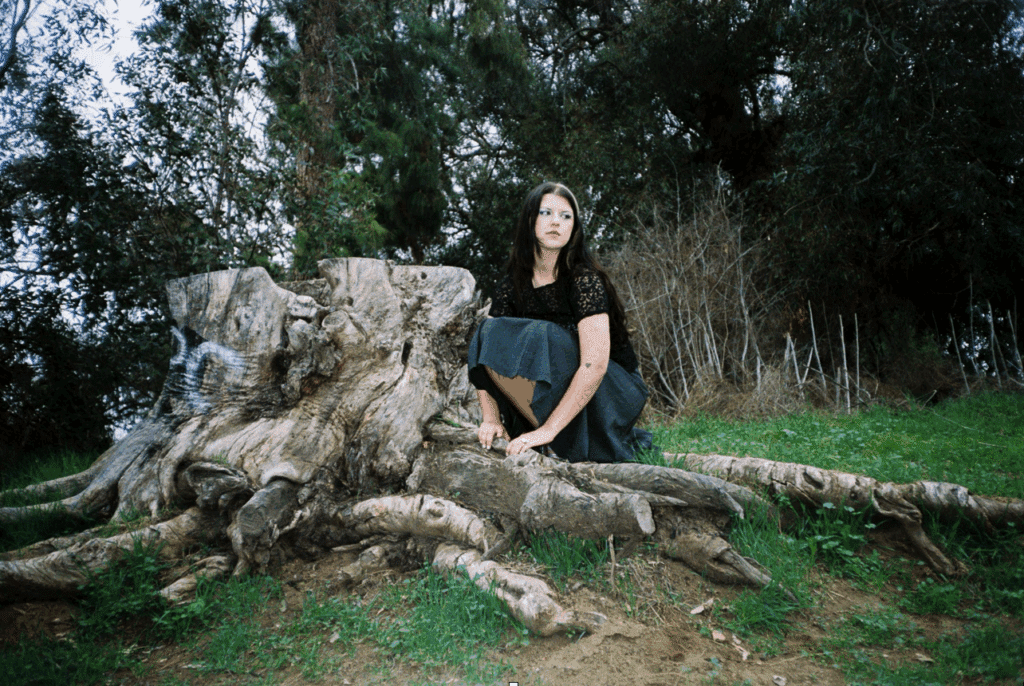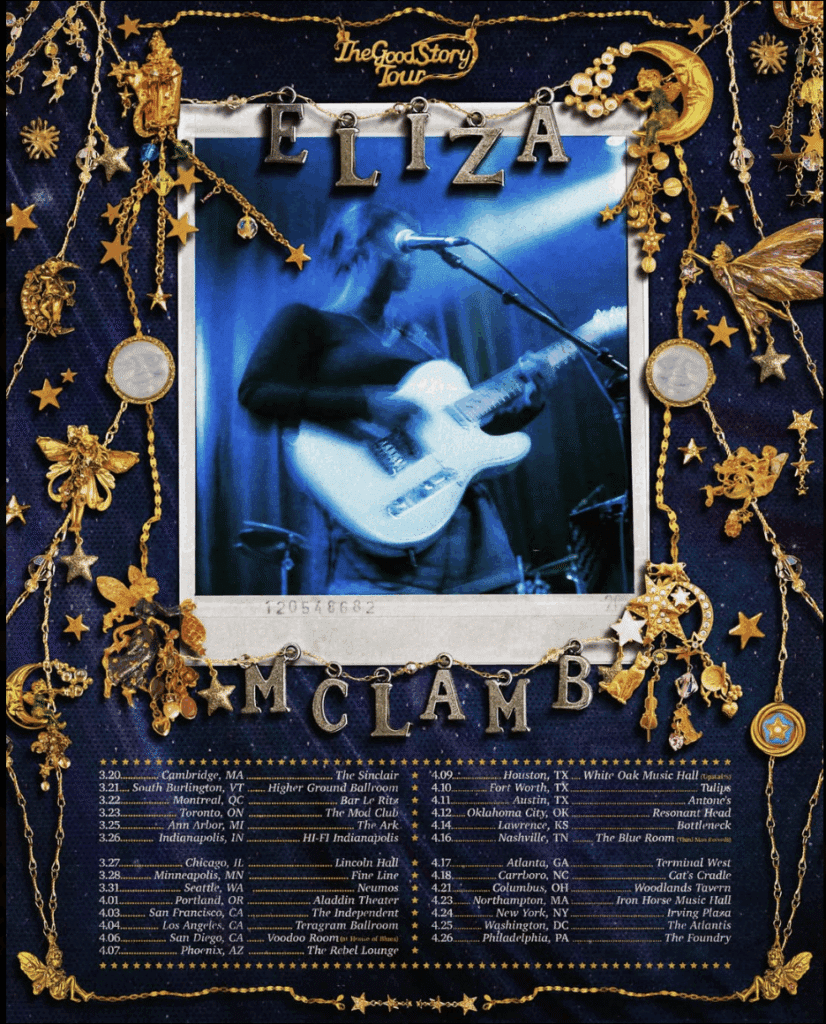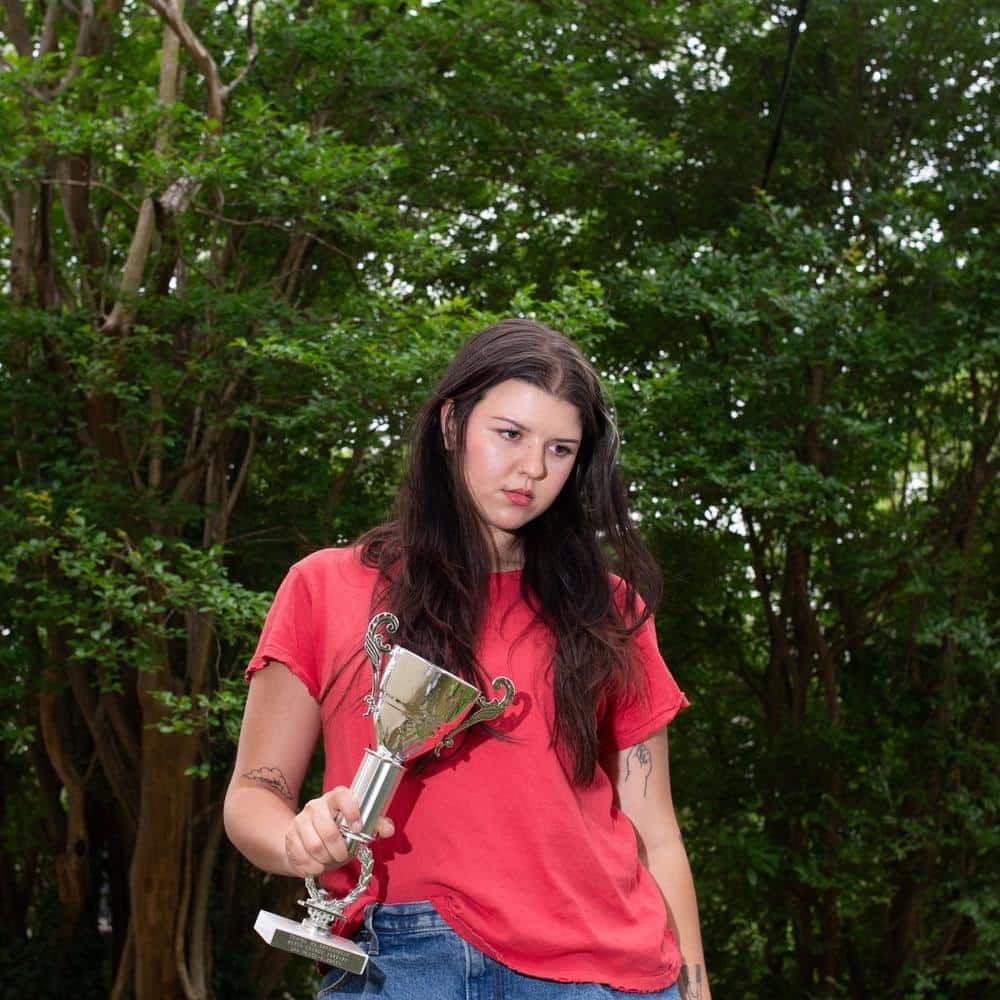Eliza McLamb on Good Story, Moving From LA to NYC, and Jeff Tweedy

Eliza Mclamb. Photo: Zoe Donahoe
Eliza McLamb entered the music industry as an artist fit to be jump-started by an algorithm. Her lyrics are rich, her instrumentals are catchy, and her projects have a wide appeal. When the chance to be a “TikTok star” became a reality, McLamb changed lanes, withdrawing herself from the social media spotlight. Instead of losing momentum after pulling her biggest hit off streaming, McLamb pursued songwriting her own way, nourishing a voice established on her newest album, Good Story.
Online popularity didn’t do it for her in the first place; all she wants is for people to engage with her music like they would a painting or a book. After a listen to Good Story, you’ll understand why. Like her sprawling Substack page, there’s a lot to cover, and if it takes multiple listens to click, that’s ok too.
McLamb sticks out in a field of fresh indie sounds because she understands that ceding creative control to an algorithm is an uninspiring route to success. “It was always very important to me, above all, to keep my work within my artistic control, no matter what someone was offering me,” she said.
In Good Story, McLamb’s personal approach to songwriting is apparent as she draws inspiration from bands like Wilco and Radiohead, and navigates the challenges of relocating from LA to NYC. Since the move, McLamb has spent subway rides writing snippets of the album, soaking up the creative flow of a city she has no intention of getting the hell out of.
On the morning of election day, I spoke with Eliza about Good Story, her creative values, and Jeff Tweedy lore.
*this interview has been edited for length and clarity.*
It’s election day, you live in Brooklyn, so it’s a big one. How are you feeling?
I’m feeling positive. My heart has been crushed and broken many times politically. So, I don’t want to jinx anything, but I’m feeling optimistic.
Agreed, and congrats on the new album! It’s a favorite in the WRSU studio; the music department was very excited to see it added.
Yay, that’s so sweet. That makes me so happy to hear.
How does it feel that it’s finally out?
It’s one of those things where all my friends and family had heard it. So, part of me felt like it had been out for a minute. I try not to have any expectations about how it will actually feel once it comes out, because it’s not as though everything suddenly changes. But I’m really, really happy to see people’s responses to it. Fans, listening to it and liking it is my favorite part of it, for sure.
You wrote the album after your move from LA to Brooklyn. How did the culture shift affect your songwriting?
A big reason why I moved from LA to New York is because I was feeling a little stuck and wanted a change to produce some generative results. Also, the pace of New York is obviously faster, and New York is denser, so I felt like I was surrounded by more energy in a way that I really needed.
In LA, I got a little too much in my own world, which was not very good for me. It was really nice to come to New York and feel energized by all the new energy. It just felt like there was more movement happening, and I think that was really conducive to being able to write more music.
Did you have any ‘New York moments’ that gave you a flash of inspiration?
The most ‘New York thing’ about the record is that a lot of the songs were written on the subway. I would say with maybe half of the songs, at some point, I was on the subway, writing a line or two, in my notes app.
You’re from North Carolina, and some of my favorite bands, Wednesday, MJ Lenderman, are out of NC. What’s it like to see bands from NC having a moment?
It’s so awesome. I think it’s so deserved. I mean, all of those bands are sort of the ‘Asheville scene.’ People who I know have worked up through that scene for so long, and it’s really cool to be able to see them getting their moment.
It seems like every new artist I love is from North Carolina.
North Carolina is so great. I think it has been an under-recognized point of culture and influence, and it’s just a beautiful state, and I love it. It’s been great to see North Carolina be so ‘up’ this year, culturally.
Back to songwriting, can you tell me about your creative process and writing style in general, whether it’s meant for a song or a Substack post?
I don’t know that I have one general approach to everything. Each project is different. I’m certainly not a regimented person. I know that there are people who are like, “I have to sit down and make sure that I write for X amount of time every single day.” And that’s certainly not how I work.
I work very cyclically, and my cycles are long, so I know there will be stretches of time where I’m just constantly writing and feeling like I have that generative energy. Then there are times when I really don’t (have it), and that’s okay. I’ve learned that it’s fine for me to go a couple of weeks without writing basically anything. Because, probably in a month or two, I’m going to be writing every single day and waking myself up in the middle of the night with ideas.
I used to get stressed out about that sort of strange way of making things, but I’m really lucky that I can support myself. So I don’t need to have the same schedule that a lot of other people are sort of compelled to have by their job or superior.
Having the freedom to write whenever is such a gift. I can hear a creative writing style in your Substack posts. Do you have a background in creative writing?
I really, really loved English classes in high school. I actually had quite a truancy problem in my last year of high school, but I would always go to the English classes because they were my favorite parts of school in general.
In college, I took one or two creative writing classes because I was really interested in the subject. However, I dropped out, so I don’t have a ton of formal experience in environments like that. I’ve always read a lot, and I’ve always written a lot, and I’ve had self-directed jobs since I was a teenager, so I have always had a lot of time to read and write.
How does having an outlet without the boundaries of a record label, like Substack, help you in your writing process?
It’s always been really important to me to maintain my artistic control and integrity. Even my label has been really great, and I made it clear when we were in negotiations that no one’s ever going to tell me not to put something on the track list, or what to change. Of course, I’m happy to hear their input, but that was a big deal for me. I’m super lucky that Royal Mountain has been so great.
Whenever you create something of value, you’re always going to get approached by bigger establishments or bigger companies wanting to offer you something. They want to absorb it into their own production and kind of take your freedom away.
Sometimes stuff like that works for people. I don’t know what’s gonna happen in the future. But for me, it was always very important to me, above all, to keep my work within my artistic control, no matter what someone was offering me.
I really enjoyed your recent Substack post; you wrote about the creative purpose and how you try not to allow the industry to manipulate it. TLDR, a lot of music today is created for clicks and algorithms rather than to engage with. It seems like a viewpoint that most artists hold back on from saying. Why was this message important to you as the first post following the album?
Yeah, I feel like it’s been something I’ve been fighting against since I started making music. I had a song that blew up on TikTok that I put on my first EP, basically to try to get people to listen to the other songs. Then, I eventually took that song down. I’ve been constantly moving away from these quick-fix ideas about art that the algorithm and that whole reward system really perpetuate.
Not enough people see it (algorithm-based music) as something that you can opt out of. I totally understand the pressures, and I think for many people, it can be something that can move streams. And, honestly, in rare cases, it can move tickets.
I wanted to be someone who says, ‘I don’t want to do this,’ and ‘I don’t think I have to,’ and I’m willing to make sacrifices because I believe that. I have worked in social media for a long time. I’m pretty good at it. I have an idea of how I can create viral moments or boost specific streams. I think there actually is a real trade-off. It’s a trade-off that we’re taking too much of one side of the bargain for. I would like to not see that happen with art.
So I feel a bit dramatic, but I take a principled stance against the kind of marketing that asks me to make something more digestible for an algorithm or for someone who’s only going to hear it for 15 seconds.

You mentioned the difficulty of moving tickets. You’ve got a tour lined up for next Spring. Are you excited to get back on the road?
I’m really excited about it. I was really bummed that it just didn’t work out for me to do a substantial tour this year, and I really missed it. We just did two album release shows, and we all sort of were like, “Okay, when’s the next show?” It kind of felt like we were back on tour. I love touring so much. I love the band, and I’m really, really excited to get back on tour and play the record for people.
I hope to see you in NYC! What music did you find in New York City that LA wasn’t in on?
I don’t know if I found anything that was particular to New York. I honestly think that a lot of my new musical inspirations came from hanging out with the band and hearing the songs and records they liked in the van, because we drove so much. I got exposed to a lot of new music that way.
My friend Jacob, who plays guitar for me, reintroduced me to Wilco this year, which has been embarrassingly affecting me. I’ve been sort of listening to Wilco constantly for a year, and I think it definitely shows in this record.
I also went back to other stuff I used to listen to that are just good classic records that people almost roll their eyes at now, because they are obviously good records. For example, The Bends by Radiohead, I was listening to it constantly.
I was feeling sort of overwhelmed by new indie rock. It was hard for me to listen to and put myself in a context with it. So, I went back and looked at some of the slightly older stuff that was more established, and it felt grounding.
Wilco is one of my all-time favorites! They’re maybe number one for me. I think Pavement is number one, and then Wilco.
That’s super awesome; I was listening to a lot of Pavement too.
Pavement and Wilco are my top two, for sure. What’s your favorite Wilco album?
I was gonna ask you that [laughs]. Well, I’ve been going through phases, like I’ve been working my way through the canon. I have been listening to one record for like two or three months straight, like, every day. So, I just–don’t know, God, it’s so hard–I have come to really, really love A Ghost Is Born.
Sometimes I just have one song, and I’m like, “At Least That’s What You Said” is the best song I’ve ever heard. But now, I’m in my Being There moment. I’ve been listening to “Misunderstood” every single day, which I also think is another one of the best songs. It’s hard. This is like an impossible question. I guess where I’m at right now is listening to Being There a lot, but I was just listening to a lot of A Ghost Is Born.
The live version of “Misunderstood” is amazing.
Their live versions are so amazing. I was just getting into the live version of “Via Chicago.” We actually did something similar with that when we played “Mausoleum” live at the release shows. “Mausoleum” is obviously a very Wilco track, but we sort of rip some of that live Via Chicago energy for it.
Do you have any thoughts on “One Sunday Morning” on Whole Love?
No, I’m not there yet.
It’s my favorite song ever. It’s a perfect Tweedy poem.
Oh my god, wait, I’m writing that down, so when I get there, I’ll remember.
I feel like Tweedy has sort of become the ‘dad of indie rock.’ How has his songwriting and approach to Rock n’ Roll affected you?
I feel like I’m summoning him; every piece of press I’ve done for the cycle, I get to the part where I’m talking about Jeff Tweedy [laughs]. When I feel sad about the state of music or marketing music, I think about Jeff Tweedy and Wilco. I really enjoyed reading his memoir. Have you read that?
Yes! I wrote a book report on it in 10th grade [laughs].
Amazing. There’s so much I don’t have to explain to you then, but there’s that anecdote in the memoir about him going to a record store and seeing a record that had an explicit sticker on it. Every week, he’d go back and scratch it off a little bit more, and then, after a month, he brings it to his mom, and he’s like, “Hey, Mom, can I buy this record?” And because it doesn’t have an explicit sticker on it, she lets him buy it.
It’s that true love and value for music that I think he really has. He is so uncompromising in his vision.
You’re saying dad of indie rock vibes, and it’s a rare moment where one of the older guys in the scene is not looking at everybody and being like, “Back in my day, we used to make real music.” He’s listening to Billie Eilish and being like “That s*** is cool.” I really love his whole orientation towards music.
He’s also one of the most economical writers ever, like that first line, in “A Shot In The Arm.” [sings] “The ashtray says you were up all night.” That is a few words, and he did everything. Like, f*** you. He has those long, drawn-out songs, too, but I think they use every single minute of their time well. He’s so great in so many ways.
Have you checked out his 2018 solo album, Warm?
Not yet, I’ve been working through the canon extremely slowly.
Eventually, Wilco’s music sort of goes downhill, but Tweedy’s solo work never lets up.
Everyone has been saying this to me. That’s sort of why I’m going slow.
Have you heard about their festival, Solid Sound?
Oh yeah. I have been texting a manager about it. Like I said, I’m summoning him [laughs], so at some point, through sheer darts on the board, something will reach his desk that has my name on it, and I hope he likes it.
You would be perfect for the lineup?
It would mean pretty much everything to me. But, you know, I’m just, I’m waiting it out. I’m not being desperate or anything. I’m waiting for it to align.
Before you go, were you a part of a radio station in college?
No, that’s actually one of my bigger regrets about college. I wish I had been more involved in the music scene, but I was sort of in an era of shirking my music side and just going full steam ahead into something else. But if I had a do-over, I would definitely do college radio, because it looks really fun. I remember thinking that all the people who were into that were really cool.
I have a show, Slanted and Enchanted Radio, for my next set, could you help me make a segment with one of your songs and two songs from other artists?
Let me think. Let me think. I think you should play “Every Year” as my song. And then let me see, I have a little notion doc, where I keep all the songs that I’m listening to now. [pauses] Wow, this is actually a lot of pressure, because I think college radio is so cool.
I think you should play “Just Like A Flower” by Winter. Do you know her?
Yeah, she’s awesome.
Damn, okay. I was hoping to put someone on [laughs].
And then, because we were talking about Wilco, you should play “Misunderstood.”
Awesome, thank you so much, this was really fun.
Yeah, thanks for chatting. Wow. Your Wilco knowledge is actually inspiring to me. This is the level I’m gonna get to one day.

Eliza McLamb’s new album Good Story is available now. Find tickets to her 2026 tour here.
